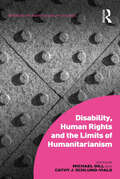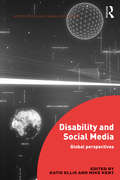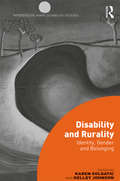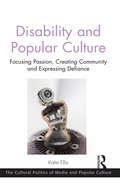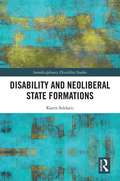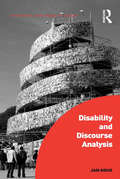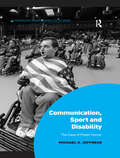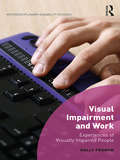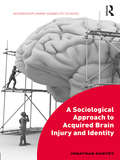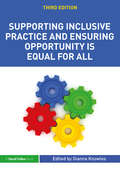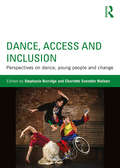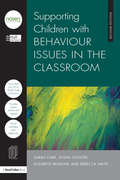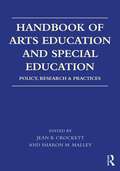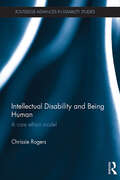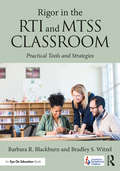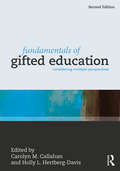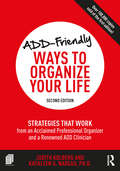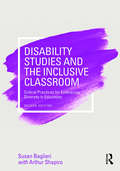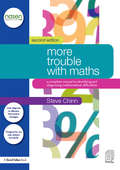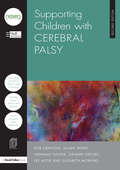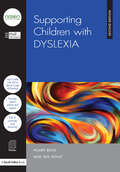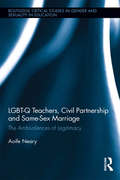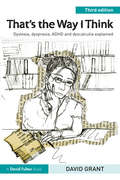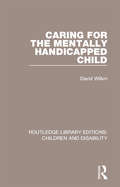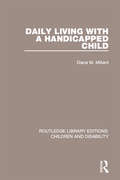- Table View
- List View
Disability, Human Rights and the Limits of Humanitarianism (Interdisciplinary Disability Studies)
by Michael Gill Cathy J. Schlund-VialsDisability studies scholars and activists have long criticized and critiqued so-termed ’charitable’ approaches to disability where the capitalization of individual disabled bodies to invoke pity are historically, socially, and politically circumscribed by paternalism. Disabled individuals have long advocated for civil and human rights in various locations throughout the globe, yet contemporary human rights discourses problematically co-opt disabled bodies as ’evidence’ of harms done under capitalism, war, and other forms of conflict, while humanitarian non-governmental organizations often use disabled bodies to generate resources for their humanitarian projects. It is the connection between civil rights and human rights, and this concomitant relationship between national and global, which foregrounds this groundbreaking book’s contention that disability studies productively challenge such human rights paradigms, which troublingly eschew disability rights in favor of exclusionary humanitarianism. It relocates disability from the margins to the center of academic and activist debates over the vexed relationship between human rights and humanitarianism. These considerations thus productively destabilize able-bodied assumptions that undergird definitions of personhood in civil rights and human rights by highlighting intersections between disability, race, gender ethnicity, and sexuality as a way to interrogate the possibilities (and limitations) of human rights as a politicized regime.
Disability and Social Media: Global Perspectives (500 Tips)
by Katie Ellis Mike KentSocial media is popularly seen as an important media for people with disability in terms of communication, exchange and activism. These sites potentially increase both employment and leisure opportunities for one of the most traditionally isolated groups in society. However, the offline inaccessible environment has, to a certain degree, been replicated online and particularly in social networking sites. Social media is becoming an increasingly important part of our lives yet the impact on people with disabilities has gone largely unscrutinised. Similarly, while social media and disability are often both observed through a focus on the Western, developed and English-speaking world, different global perspectives are often overlooked. This collection explores the opportunities and challenges social media represents for the social inclusion of people with disabilities from a variety of different global perspectives that include Africa, Arabia and Asia along with European, American and Australasian perspectives and experiences.
Disability and Rurality: Identity, Gender and Belonging (Interdisciplinary Disability Studies)
by Karen Soldatic Kelley JohnsonThis is the first book to explore how far disability challenges dominant understandings of rurality, identity, gender and belonging within the rural literature. The book focuses particularly on the ways disabled people give, and are given, meaning and value in relation to ethical rural considerations of place, physical strength, productivity and social reciprocity. A range of different perspectives to the issues of living rurally with a disability inform this work. It includes the lived experience of people with disabilities through the use of life history methodologies, rich qualitative accounts and theoretical perspectives. It goes beyond conventional notions of rurality, grounding its analysis in a range of disability spaces and places and including the work of disability sociologists, geographers, cultural theorists and policy analysts. This interdisciplinary focus reveals the contradictory and competing relations of rurality for disabled people and the resultant impacts and effects upon disabled people and their communities materially, discursively and symbolically. Of interest to all scholars of disability, rural studies, social work and welfare, this book provides a critical intervention into the growing scholarship of rurality that has bypassed the pivotal role of disability in understanding the lived experience of rural landscapes.
Disability and Popular Culture: Focusing Passion, Creating Community and Expressing Defiance (The\cultural Politics Of Media And Popular Culture Ser.)
by Katie EllisAs a response to real or imagined subordination, popular culture reflects the everyday experience of ordinary people and has the capacity to subvert the hegemonic order. Drawing on central theoretical approaches in the field of critical disability studies, this book examines disability across a number of internationally recognised texts and objects from popular culture, including film, television, magazines and advertising campaigns, children’s toys, music videos, sport and online spaces, to attend to the social and cultural construction of disability. While acknowledging that disability features in popular culture in ways that reinforce stereotypes and stigmatise, Disability and Popular Culture celebrates and complicates the increasing visibility of disability in popular culture, showing how popular culture can focus passion, create community and express defiance in the context of disability and social change. Covering a broad range of concerns that lie at the intersection of disability and cultural studies, including media representation, identity, the beauty myth, aesthetics, ableism, new media and sport, this book will appeal to scholars and students interested in the critical analysis of popular culture, across disciplines such as disability studies, sociology and cultural and media studies.
Disability and Neoliberal State Formations: The Case Of Australia (Interdisciplinary Disability Studies)
by Karen SoldaticDisability and Neoliberal State Formations explores the trajectory of neoliberalism in Australia and its impact on the lives of Australians living with disability, including Aboriginal and Torres Strait Islander peoples. It examines the emergence, intensification and normalisation of neoliberalism across a 20-year period, distilling the radical changes to disability social security and labour-market law, policy and programming, and the enduring effects of the incremental tightening of disability eligibility carried out by Australian governments since the early 2000s. Incorporating qualitative interviews with disabled people, disability advocates, services and the policy elite, alongside extensive documentary material, this book brings to the fore the compounding effects of neoliberal reforms for disabled people’s wellbeing and participation. The work is of international significance as it illustrates the importance of looking beyond the UK, EU and the USA to critically understand the historical development and policy mobility of disability neoliberal retraction from smaller economies, such as Australia, to the global economic centre.
Disability and Discourse Analysis (Interdisciplinary Disability Studies)
by Jan GrueDisability studies has engaged with discourse analysis in key works both from the UK and the USA. While the perspectives and analyses of discourse analysis have proved well suited for exploring disability, however, its methods have not been sufficiently developed in a disability studies context. Conversely, discourse analysts have traditionally been concerned with social issues and fields in which asymmetric power relations, marginalization, and discrimination play a central role, e.g. gender, race, ethnicity, and sexual orientation, all of which share many analytical features with disability. But although efforts have been made to integrate disability into the discourse analysis and conversation analysis canon, the link between the two fields needs to be strengthened. This ground-breaking volume contributes to this link by thoroughly applying the analytical vocabulary of discourse analysis to issues that are central to the field of disability studies. It strengthens disability studies by supplying case studies of representations and constructions of disability and disabled people in discourse, theorizes the role played by language in the social construction of disability, and makes disability a more salient topic for discourse analysts.
Communication, Sport and Disability: The Case of Power Soccer (Interdisciplinary Disability Studies)
by Michael S. JeffressSports are ubiquitous in American society, and given their prominence in the culture, it is easy to understand how most youth in the United States face pressure to participate in organized sports. But what does this mean for the hundreds of thousands of Americans who live with one or more physical disabilities and, in particular, those in powered wheelchairs? Located at the intersection of sports and disability, this book tells the story of power soccer - the first competitive team sport specifically designed for electric wheelchair users. Beginning in France in the 1970s, today, over sixty teams compete within the United States Power Soccer Association (USPSA) and the sport is actively played in over thirty countries. Using ethnographic research conducted while attending practices, games, and social functions of teams from across the nation, Jeffress builds a strong case that electric wheelchair users deserve more opportunity to play sports. They deserve it because they need the same physical and psychosocial benefits from participation as their peers, who have full use of their arms and legs. It challenges the social constructions and barriers that currently stand in the way. Most importantly, this book tells the story of some amazing power soccer athletes. It is a moving, first-hand account of what power soccer means to them and the implications this has for society.
Visual Impairment and Work: Experiences of Visually Impaired People (Interdisciplinary Disability Studies)
by Sally FrenchThis book traces the development of paid work for visually impaired people in the UK from the 18th century to the present day. It gives a voice to visually impaired people to talk about their working lives and documents the history of employment from their experience, an approach which is severely lacking in the current literature about visual impairment and employment. By analysing fifty in-depth face-to-face interviews with visually impaired people talking about their working lives (featuring those who have worked in traditional jobs such as telephony, physiotherapy and piano tuning, to those who have pursued more unusual occupations and professions), and grouping them according to occupation and framed by documentary, historical research, these stories can be situated in their broader political, economic, ideological and cultural contexts. The themes that emerge will help to inform present day policy and practice within a context of high unemployment amongst visually impaired people of working age. It is part of a growing literature which gives voice to disabled people about their own lives and which adds to the growing academic discipline of disability studies and the empowerment of disabled people.
A Sociological Approach to Acquired Brain Injury and Identity (Interdisciplinary Disability Studies)
by Jonathan HarveyInspired by the author’s personal experience of sustaining acquired brain injury (ABI), this path-breaking book explores the (re)construction of identity after ABI. It offers a way of understanding ABI through a social scientific lens, promoting an understanding that is generated through close engagement with the lives and experiences of ABI survivors. The author follows the everyday experiences of six male survivors and critically investigates their identity (re)construction after their ABI. As well as demonstrating identity (re)construction after ABI, the experiences of the participants allow the reader to investigate neurological rehabilitation from their perspective. This book suggests that rehabilitation after ABI is often a continual process that extends beyond the formal, medically prescribed period. It also shows that identity after ABI is often (re)constructed in an unpredictable way; a way that emphasises the importance of reciprocal support and the uncertainty of future life. A Sociological Approach to Acquired Brain Injury and Identity is essential reading for academics and students from a range of social scientific disciplines with an interest in biographical or ethnographic research methods. This book offers a social scientific view of rehabilitation and as such is also essential reading for academics, students and professionals with an interest in health and illness, particularly neurological rehabilitation and brain injury rehabilitation.
Supporting Inclusive Practice and Ensuring Opportunity is Equal for All
by Gianna KnowlesThis third edition of Supporting Inclusive Practice builds on the successful format of the previous two editions, both in content and structure. It explores many aspects of inclusive practice relevant to those who work with children in schools and other educational settings, aiming to provide the most up-to-date theoretical knowledge and understanding in the field, and illustrating the theory with examples of good practice in the areas explored. Many of the topics that have appeared in the previous editions, including supporting children for whom English is a second language, children on the autistic spectrum and children with neurodiversity conditions, also appear in this edition. The revised content of this third edition also covers recent and relevant changes in national policy and legislation, particularly, for example, around changes in equality and disability, same-sex parenting and transgender children and parenting policy and legislation. It explores the impact on aspects of inclusive practice legislation such as the Equality Act 2010, Marriage (Same Sex Couples) Act 2013 and the Children and Families Act 2014. It also explores in detail the revised 2014 SEN Code of Practice and the introduction of the pupil premium in 2011, which provides support for the education of children from low income families or who may be children who are fostered or in care. Throughout, the book is informed by the solution-focused social model of special educational needs and disability, and reflects current national policy that sees inclusive practice as fundamental to ensure equality of educational opportunity is achieved for all children.
Dance, Access and Inclusion: Perspectives on Dance, Young People and Change
by Charlotte Svendler Nielsen Stephanie BurridgeThe arts have a crucial role in empowering young people with special needs through diverse dance initiatives. Inclusive pedagogy that integrates all students in rich, equitable and just dance programmes within education frameworks is occurring alongside enabling projects by community groups and in the professional dance world where many high-profile choreographers actively seek opportunities to work across diversity to inspire creativity. Access and inclusion is increasingly the essence of projects for disenfranchised and traumatised youth who find creative expression, freedom and hope through dance. This volume foregrounds dance for young people with special needs and presents best practice scenarios in schools, communities and the professional sphere. International perspectives come from Australia, Brazil, Cambodia, Canada, Denmark, Fiji, Finland, India, Indonesia, Jamaica, Japan, Malaysia, New Zealand, Norway, Papua New Guinea, Portugal, Singapore, South Africa, Spain, Taiwan, Timor Leste, the UK and the USA. Sections include: inclusive dance pedagogy equality, advocacy and policy changing practice for dance education community dance initiatives professional integrated collaborations
Supporting Children with Behaviour Issues in the Classroom
by Hull City CouncilThis completely revised edition is an easy to use resource for teachers, TAs and SENCOs concerned about behavioural issues in the classroom. It will support school staff in their approach to a range of behavioural issues, through a range of tried-and-tested strategies, including: How to create an environment of support and acceptance Techniques to provide an effective leaning environment Ways in which to communicate clearly with children with poor communication skills Whole class and whole school approaches for a positive learning environment How to maintain appropriate behaviours during unstructured break times This accessible reference tool will help any teacher to create and maintain a classroom environment conducive to learning. Packed with resources, it also includes templates and example Personal Support Plans, written by practitioners for practitioners.
Handbook of Arts Education and Special Education: Policy, Research, and Practices
by Jean B. Crockett Sharon M. MalleyThe Handbook of Arts Education and Special Education brings together, for the first time in a single reference volume, policy, research, and practices in special education and arts education synthesized to inform stakeholders across a broad spectrum of education. This handbook encompasses arts education for students with disabilities, from pre-K through transition to postsecondary education and careers as well as community arts education, with particular attention to conceptual foundations; research-based practices; professional standards; students’ cognitive, artistic, and social growth; career education; and future directions for research and practice in special education and arts education.
Intellectual Disability and Being Human: A Care Ethics Model (Routledge Advances in Disability Studies)
by Chrissie RogersIntellectual disability is often overlooked within mainstream disability studies, and theories developed about disability and physical impairment may not always be appropriate when thinking about intellectual (or learning) disability. This pioneering book, in considering intellectually disabled people's lives, sets out a care ethics model of disability that outlines the emotional caring sphere, where love and care are psycho-socially questioned, the practical caring sphere, where day-to-day care is carried out, and the socio-political caring sphere, where social intolerance and aversion to difficult differences are addressed. It does so by discussing issue-based everyday life, such as family, relationships, media representations and education, in an evocative and creative manner. This book draws from an understanding of how intellectual disability is represented in all forms of media, a feminist ethics of care, and capabilities, as well as other theories, to provide a critique and alternative to the social model of disability as well as illuminate care-less spaces that inhabit all the caring spheres. The first two chapters of the book provide an overview of intellectual disability, the debates surrounding disability, and outline the model. Having begun to develop an innovative theoretical framework for understanding intellectual disability and being human, the book then moves onto empirical and narrative driven issue-based chapters. The following chapters build on the emergent framework and discuss the application of particular theories in three different substantive areas: education, mothering and sexual politics. The concluding remarks draw together the common themes across the applied chapters and link them to the overarching theoretical framework. An important read for all those studying and researching intellectual or learning disability, this book will be an essential resource in sociology, philosophy, criminology (law), social work, education and nursing in particular.
Rigor in the RTI and MTSS Classroom: Practical Tools and Strategies
by Barbara R. Blackburn Bradley Steven WitzelIn this new book, bestselling author Barbara R. Blackburn and intervention expert Bradley S. Witzel show you how to develop rigorous RTI and MTSS programs that will support students and lead them to lasting success. Written in a clear, engaging style, Rigor in the RTI and MTSS Classroom combines an in-depth discussion of the issues facing at-risk and learning-disabled students with practical strategies for all teachers. You’ll discover how to: Improve academic and social-emotional performance with scaffolding and demonstration of learning techniques; Establish and teach class rules, expectations, and consequences; Use evidence-based activities to spark student discussion; Implement rigorous, research-based strategies for math, literacy, reading, and writing development; Assess student growth and encourage self-reflection. Form an MTSS leadership team to ensure that student needs are met across building and district levels. Each chapter contains anecdotes from schools across the country as well as a variety of ready-to-use tools and activities. Many of the tools are offered as free eResources at www.routledge.com/9781138193383, so you can easily print and distribute them for classroom use.
Fundamentals of Gifted Education: Considering Multiple Perspectives
by Carolyn M. Callahan Holly L. Hertberg-DavisThe field of gifted education is characterized by a perplexing array of perspectives concerning such fundamental issues as definition, identification, curriculum, social and emotional development, and underserved populations. Fundamentals of Gifted Education provides a coherent framework for planning effective programs, providing appropriate educational services, and evaluating programs for the gifted. Parts are organized around fundamental issues confronting the field and follow a common structure: an introductory chapter that provides an overview of the theme of that part as well as guiding points and questions for the reader followed by representative point-of-view chapters written by leading experts that provide varied perspectives on the topic at hand.
ADD-Friendly Ways to Organize Your Life: Strategies that Work from an Acclaimed Professional Organizer and a Renowned ADD Clinician
by Kathleen Nadeau Judith KolbergAcclaimed professional organizer Judith Kolberg and Dr. Kathleen Nadeau, renowned ADHD clinical psychologist, are back with an updated edition of their classic text for adults with ADD. Their collaboration offers the best understanding and solutions for adults who want to get and stay organized. Readers will enjoy all new content on organizing digital information, managing distractions, organizing finances, and coping with the "black hole" of the Internet. This exciting new resource offers three levels of strategies and support: self-help, non-professional assistance from family and friends, and professional support; allowing the reader to determine the appropriate level of support.
Disability Studies and the Inclusive Classroom: Critical Practices for Embracing Diversity in Education
by Susan BaglieriDisability Studies and the Inclusive Classroom is a core textbook that integrates knowledge and practice from the fields of disability studies and special education. The second edition has been fully revised and updated throughout to include stronger connections between race, class, sexual orientation, gender, and disability to emphasize intersecting identities and experiences; stronger emphasis on curriculum and teaching rather than on attitudes toward disability; and updates to current events, cultural references, resources, research literature, laws, and policies.
More Trouble with Maths: A Complete Manual to Identifying and Diagnosing Mathematical Difficulties (nasen spotlight)
by Steve ChinnMore Trouble with Maths acknowledges that there are many reasons why children and adults are unable to function mathematically. Difficulties include problems with rote learning basic facts and procedures, debilitating anxiety, poor working and short-term memories and mathematics vocabulary. Central to this new edition is a range of standardised tests and diagnostic activities, including a 15 minute test of basic mathematics, a thinking style test, tests of basic fact retrieval and maths anxiety. Guiding the reader in the interpretation of tests, this new edition shows how identifying the barriers to learning is the first step in a programme of intervention. Written in an engaging and user-friendly style, Steve Chinn draws on his extensive experience and expertise to: show how to consider and appraise the many factors relating to mathematical learning difficulties explain how these factors can be investigated explore their impact on learning mathematics. Emphasising the need for a clinical approach when assessing individuals, this book shows how diagnosis and assessment can become integrated into everyday teaching. This highly practical and relevant resource is a crucial resource for anyone who wants to accurately and effectively identify the depth and nature of mathematical learning difficulties and dyscalculia.
Supporting Children with Cerebral Palsy (nasen spotlight)
by Hull City CouncilCompletely revised and fully updated in light of the 2014 SEND Code of Practice, this edition familiarises readers with the specific learning needs of cerebral palsy. Offering practical tips and tried-and-tested strategies from professional practitioners, this accessible guide provides advice on how to meet the needs of young people with cerebral palsy. This new edition presents all of the information practitioners will need to know to deliver outstanding provision for young people with cerebral palsy and support the inclusion of children and young people with cerebral palsy into mainstream schools. The far-reaching advice found within this guide includes: Planning for a pupil with cerebral palsy Accessing the curriculum, including specific advice on each subject area How to make effective use of support staff Developing independence skills Liaising between home and school Making the transition into adulthood With accessible materials, such as checklists, templates and photocopiable resources, this up-to-date guide will enable teachers and other professionals to feel more confident and effective in the support they can provide.
Supporting Children with Dyslexia (nasen spotlight)
by Hull City CouncilCompletely revised and updated in light of the new 2014 SEND Code of Practice, this second edition of Supporting Children with Dyslexia provides valuable advice and resources for teachers, TAs and SENCOs supporting pupils on the dyslexic spectrum. This practical resource will help those who are looking for expert guidance and strategies, as well as providing a professional development tool which will encourage outstanding practice at all levels. Spanning pre-school, primary and secondary teaching, this book covers the key areas to be considered when supporting pupils with dyslexia, including: how to identify a young person with dyslexia practical strategies for pre-school, primary and secondary settings useful advice to give to parents and carers of children and young people with dyslexia useful materials for continual professional development. Featuring helpful checklists, templates and photocopiable resources, this book provides guidance and practical strategies for identifying and supporting young people with dyslexia that will be of use to teachers, TAs, SENCOs and other educational professionals.
LGBT-Q Teachers, Civil Partnership and Same-Sex Marriage: The Ambivalences of Legitimacy (Routledge Critical Studies in Gender and Sexuality in Education)
by Aoife NearyThe introduction of legislative structures for same-sex relationships provides a new lens for grappling with the politics of sexuality in schools and society. The emergence of civil partnership and same-sex marriage in Ireland brings to the fore international debates around public intimacy, religion in the public sphere, secularism and the politics of sexuality equality. Building on queer, feminist and affect theory in innovative ways, this book offers insight into the everyday negotiations of LGBT-Q teachers as they operate between and across the intersecting fields of education, religion and LGBT-Q politics. Neary illustrates the complexity of negotiating personal and professional identities for LGBT-Q teachers.
That's the Way I Think: Dyslexia, dyspraxia, ADHD and dyscalculia explained
by David GrantAbout 1 in 20 individuals are dyslexic. This figure also applies for dyspraxia and ADHD. This fully revised edition of David Grant’s thought-provoking, insightful book develops our understanding of these specific learning differences and considers the further challenges presented by these overlapping conditions. This new edition includes a brand-new chapter on dyscalculia. New sections also explore updates in the study of dyslexia, dyspraxia and ADHD as well as visualisation and synaesthesia, in the light of new data and research. These updates enable the reader to gain a fuller understanding of the sensory experiences and thoughts of individuals with specific learning differences. The author takes a life-style approach to explain many of the everyday experiences and choices of individuals with specific learning differences, including sleep, sports, visualisation and creativity, and uses real life examples explained in the words of those with specific learning differences. The accessible style of this book will immediately strike a chord with anyone with first or second-hand experience of specific learning differences. It is invaluable and insightful reading for those with specific learning differences as well as their parents and/or partner, teachers, teaching assistants and SENCos.
Caring for the Mentally Handicapped Child (Routledge Library Editions: Children and Disability #12)
by David WilkinFirst published in 1979, this book concerns itself primarily with the mothers of mentally handicapped children. It discusses the problems of assistance that they may have experienced from their families, the community, or the available services. Whilst arguing for far more support for mothers when they are the main carer, this book also suggests reasons why some families are more easily able to cope with the problems of caring for severely handicapped children. <P><P>This study is based on research that was conducted for and funded by the Department of Health and Social Security between 1973 and 1976.
Daily Living with a Handicapped Child (Routledge Library Editions: Children and Disability #11)
by Diana M. MillardFirst published in 1984, this book focuses on the support and reassurance needed by parents of children with handicaps. It provides a practical guide in relation to daily care and is equally as relevant to professionals, therapists, teachers, doctors and psychologists who must advise parents. Written by an Occupational Therapist, the book highlights the need to make such children as independent as possible and gives advice on care of a special baby, modifications to the home environment, the needs of a child with a physical handicap, problems of educational handicap, and the place of a child in the family and community.
